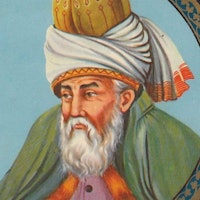The angels are our friends, They are always there to help us, We can pray to them for guidance, protection, and healing.
Jalaluddin Mevlana Rumi

The Angels Are Our Friends
Topic: Life Beyond Death & the Spirit World
The angels are our friends, They are always there to help us, We can pray to them for guidance, protection, and healing.
Jalāl al-Dīn Muḥammad Rūmī (born September 30, 1207, in Balkh, present-day Afghanistan – died December 17, 1273, in Konya, present-day Turkey) is revered as one of the world’s greatest poets, mystics, and spiritual teachers. Known in the West simply as Rumi, he was born into a family of scholars and mystics who fled westward during the Mongol invasions, eventually settling in Konya, then part of the Seljuk Empire. Under the guidance of his father, Bahāʾ al-Dīn Walad, Rumi was trained in Islamic theology, jurisprudence, and the contemplative disciplines of the Sufi path. His early years reflected the classical model of a scholar-saint—rooted in devotion, study, and service to his community.
Rumi’s life was transformed by his meeting with the wandering mystic Shams of Tabriz around 1244. Their profound spiritual companionship awakened in Rumi a passion that transcended formal learning and opened him to the depths of divine love. When Shams mysteriously disappeared, Rumi’s grief became the flame that illuminated his poetry and devotion. From this crucible emerged the Mathnawī, often called the “Persian Qur’an,” a six-volume masterpiece that weaves stories, parables, and reflections into a vision of love as the animating force of all creation. His shorter lyric poems, collected in the Divan-e Shams-e Tabrizi, sing of longing, union, loss, and the ecstatic dance between the soul and the Beloved.
Rumi’s teachings centered on the transforming power of divine love, the unity underlying all faiths, and the inward journey from self-centeredness to God-centeredness. He taught that every experience—joy and sorrow, presence and absence—serves as a mirror reflecting the divine mystery. After his passing, his followers established the Mevlevi Order, known for its sacred whirling as a form of remembrance (dhikr). Across eight centuries, Rumi’s voice has transcended language, culture, and creed, inviting seekers into the stillness of the heart where the human and divine meet in love.
Mathnawi
Rumi, Jalal al-Din. The Masnavi. Trans. Coleman Barks, Penguin Books, 1996.

Jalaluddin Mevlana Rumi

About this Rumi Quotation [Commentary]
Rumi’s reflections on angels highlight their constant presence and role in human life. He describes angels as “created from light,” serving as intermediaries between humanity and the Divine. Though unseen, they are always with us, offering a sense of quiet reassurance. This understanding aligns with the mystical tradition of Islam, where angels act as helpers and guides, fulfilling God’s will. Rumi’s words invite readers to recognize these celestial beings as ever-present companions.
In the quoted lines, Rumi portrays angels as compassionate helpers, ready to offer guidance, protection, and healing. He encourages prayer as a way to seek their assistance, suggesting that divine help is always accessible. Referring to angels as friends emphasizes their supportive and benevolent nature, offering comfort during life’s difficulties while fostering a deeper connection to God.
Rumi’s teachings on angels, influenced by Islamic scripture and personal spiritual insight, depict them as bridges to the Divine. They not only serve God but also aid in worldly matters and spiritual growth. While angels remain unseen by many of us, their light-filled presence provides guidance and support, reminding us of the intimate link between humanity and the spiritual realm.
Rumi On the Angels―Commentary by Coleman Barks
When we learn to listen to our angels, we open ourselves up to a world of possibilities. They can help us to heal our wounds, overcome our challenges, and achieve our dreams. They can also help us to connect with our loved ones who have passed away and to find peace and comfort in times of sorrow.
Rumi’s angels are our messengers from the other side. They are the ones who bring us messages of love, hope, and guidance. They are the ones who help us to see the light in the darkness and to find our way home. (Barks, Coleman. Rumi On Love and Angels)
Rumi taught that angels are divine beings who are created from light and are constantly in the presence of God. He believed that angels are messengers of God’s love and mercy, and that they are always with us, even though we cannot always see them.
In his book The Masnavi, Rumi writes:
Rumi also believed that angels can help us in all areas of our lives. He taught that we can pray to angels for guidance, protection, and healing. He also believed that angels can help us to connect with God.
Rumi’s teachings on angels are inspired by the Quran and the Hadith. He also drew on his own personal experiences and spiritual insights.
Related Quotes
Copyright © 2017 – 2026 LuminaryQuotes.com About Us